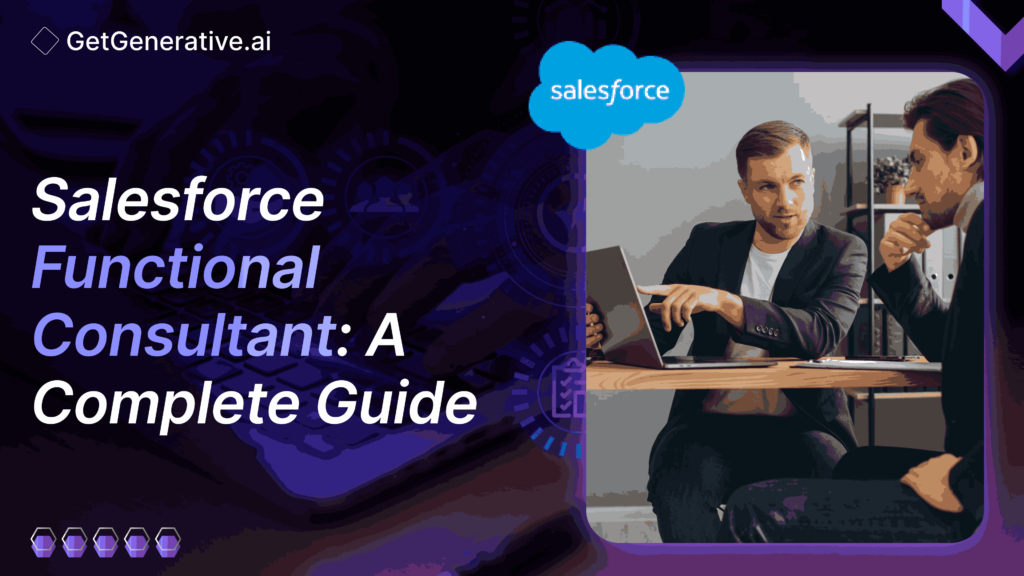Salesforce Functional Consultant: A Complete Guide 2024
Salesforce has revolutionized business operations. To harness its full potential, companies often rely on Salesforce Functional Consultants. These professionals bridge the gap between business needs and technological solutions, ensuring that Salesforce is implemented and utilized effectively.
Salesforce Functional Consultants can significantly enhance business operations by increasing customer satisfaction by 45% and boosting sales revenue by 37% post-implementation. This blog will explore what a Salesforce Functional Consultant does, how to become one, the necessary certifications, and more.
What Does a Salesforce Functional Consultant Do?
A Salesforce Functional Consultant works closely with stakeholders to understand business requirements and translate them into effective Salesforce solutions. Their responsibilities include:
- Gathering and analyzing business requirements.
- Designing Salesforce solutions that align with business goals.
- Configuring Salesforce to meet specific needs.
- Conducting user training and support.
- Ensuring smooth implementation and deployment of Salesforce solutions.
- Collaborating with technical teams to customize Salesforce functionalities.
- Continuously optimizing Salesforce processes to enhance efficiency.
How to Become a Salesforce Functional Consultant?
Becoming a Salesforce Functional Consultant involves a combination of education, experience, and certifications. Here’s a step-by-step guide:
- Educational Background: A bachelor’s degree in business, IT, or a related field is often required.
- Salesforce Knowledge: Gain a thorough understanding of Salesforce through online courses, tutorials, and hands-on practice.
- Certifications: Obtain relevant Salesforce certifications (discussed below).
- Experience: Gain experience in business analysis, project management, or CRM implementation.
- Networking: Connect with professionals in the Salesforce ecosystem through forums, events, and LinkedIn.
- Continuous Learning: Stay updated with the latest Salesforce releases and features.
Salesforce Functional Consultant Job Description
A typical job description for a Salesforce Functional Consultant includes:
- Collaborating with business stakeholders to gather requirements.
- Designing and implementing Salesforce solutions.
- Configuring Salesforce according to business needs.
- Providing end-user training and support.
- Conducting regular system audits and data integrity checks.
- Troubleshooting and resolving Salesforce-related issues.
- Working with technical teams to develop custom solutions and integrations.
- Documenting processes and creating user guides.
Also Read – Salesforce CPQ Consultant: A Complete Guide
Salesforce Functional Consultant Salary
Salaries for Salesforce Functional Consultants can vary based on experience, location, and industry. On average:
- Entry-Level: $70,000 – $90,000 per year.
- Mid-Level: $90,000 – $120,000 per year.
- Senior-Level: $120,000 – $150,000 per year
What Certifications Are Needed for a Salesforce Functional Consultant?
Certifications are crucial for establishing credibility and expertise. Key certifications include:
- Salesforce Certified Administrator: Validates knowledge of Salesforce configuration and management.
- Salesforce Certified Advanced Administrator: Demonstrates advanced knowledge and skills.
- Salesforce Certified Sales Cloud Consultant: Focuses on sales solutions within Salesforce.
- Salesforce Certified Service Cloud Consultant: Specializes in service solutions.
- Salesforce Certified Platform App Builder: Covers the fundamentals of app building on Salesforce.
What Skills are Essential for a Salesforce Functional Consultant?
The role of a Salesforce Functional Consultant requires a unique blend of technical and soft skills. Here’s a detailed look at the essential skills:
Analytical Skills
Analytical skills are critical for understanding complex business processes and translating them into effective Salesforce solutions. This involves:
- Business Analysis: Evaluating business processes and identifying areas for improvement.
- Data Interpretation: Analyzing data to identify trends, patterns, and insights that can inform decision-making.
- Problem Solving: Diagnosing issues within the Salesforce environment and devising effective solutions.
Communication Skills
Strong communication skills are vital for a Salesforce Functional Consultant to bridge the gap between technical teams and business stakeholders. Key aspects include:
- Listening: Actively listening to stakeholders to understand their needs and concerns.
- Presenting: Presenting solutions and strategies to both technical and non-technical audiences.
- Writing: Crafting detailed documentation, reports, and user guides.
Project Management
Effective project management ensures that Salesforce implementations are delivered on time, within scope, and on budget. Essential project management skills include:
- Planning: Developing comprehensive project plans with clear milestones and deliverables.
- Organization: Keeping track of tasks, deadlines, and resources to ensure smooth project execution.
- Risk Management: Identifying potential risks and developing mitigation strategies.
Also Read – Salesforce Data Cloud Consultant: The Role and Importance
Problem-Solving Skills
Problem-solving is at the core of a Salesforce Functional Consultant’s role. This involves:
- Troubleshooting: Diagnosing and resolving issues quickly to minimize disruption.
- Innovation: Thinking creatively to develop novel solutions to business challenges.
- Adaptability: Adjusting strategies and solutions in response to changing business needs.
Technical Acumen
A solid understanding of Salesforce’s technical capabilities is essential. Key technical skills include:
- Salesforce Configuration: Expertise in configuring Salesforce to meet specific business needs, including custom objects, fields, and workflows.
- Data Management: Proficiency in managing and maintaining data within Salesforce, including data migration, quality, and integration.
- App Development: Knowledge of the Salesforce platform and its tools, such as Lightning App Builder, to create custom applications.
Business Acumen
Understanding the business context in which Salesforce operates is crucial. This includes:
- Industry Knowledge: Familiarity with the industry’s challenges, trends, and regulatory requirements.
- Strategic Thinking: Aligning Salesforce solutions with broader business goals and strategies.
- Customer Focus: Keeping the end-users’ needs and experiences at the forefront of all solutions.
Interpersonal Skills
Building strong relationships with stakeholders is essential for a Salesforce Functional Consultant. Important interpersonal skills include:
- Collaboration: Working effectively with cross-functional teams, including developers, analysts, and managers.
- Negotiation: Balancing different interests and negotiating compromises when necessary.
- Empathy: Understanding and addressing the concerns and perspectives of various stakeholders.
Training and Development
Providing training and ongoing support to users is a key part of the role. Skills in this area include:
- Instructional Design: Creating effective training materials and programs that cater to different learning styles.
- Coaching: Offering one-on-one or group coaching sessions to help users get the most out of Salesforce.
- Support: Providing ongoing support and troubleshooting to ensure continuous user satisfaction and system adoption.
Change Management
Managing change effectively is crucial for the success of Salesforce projects. Skills in change management include:
- Change Planning: Developing change management plans that address communication, training, and support.
- Stakeholder Engagement: Ensuring all stakeholders are informed, involved, and supportive of the changes.
- Resistance Management: Identifying and addressing resistance to change to ensure smooth transitions.
Attention to Detail
Ensuring the accuracy and completeness of Salesforce configurations and documentation requires the following:
- Precision: Pay attention to details to avoid errors and ensure high-quality solutions.
- Consistency: Maintaining consistency in configurations, naming conventions, and documentation.
- Thoroughness: Conduct thorough testing and validation to ensure solutions meet requirements and perform as expected.
By mastering these skills, a Salesforce Functional Consultant can effectively bridge the gap between business needs and technical solutions, ensuring successful Salesforce implementations and maximizing the platform’s value.
Related Read – Becoming a Salesforce Consultant – The Ultimate Guide
Conclusion
The role of a Salesforce Functional Consultant is dynamic and essential for the successful implementation and optimization of Salesforce solutions. You can excel in this rewarding career with the right combination of skills, certifications, and experience.
Enhance your Salesforce consulting with GetGenerative.ai. Effortlessly craft outstanding proposals, enabling you to dedicate more time to providing exceptional client service.
Start today!
Frequently Asked Questions (FAQs)
1. What is the average salary of a Salesforce Functional Consultant?
The average salary ranges from $70,000 to $150,000 annually.
2. What certifications are necessary?
Key certifications include Salesforce Certified Administrator, Advanced Administrator, Sales Cloud Consultant, Service Cloud Consultant, and Platform App Builder.
3. What skills are essential for this role?
Analytical skills, communication, project management, problem-solving, and technical acumen are essential.
4. How do I start a career as a Salesforce Functional Consultant?
Obtain a relevant degree, gain Salesforce certifications, acquire hands-on experience, and develop essential skills.
5. What are the best practices for Salesforce implementation?
Understand business processes, keep configurations simple, ensure data quality, invest in user training, and stay updated with new features.




